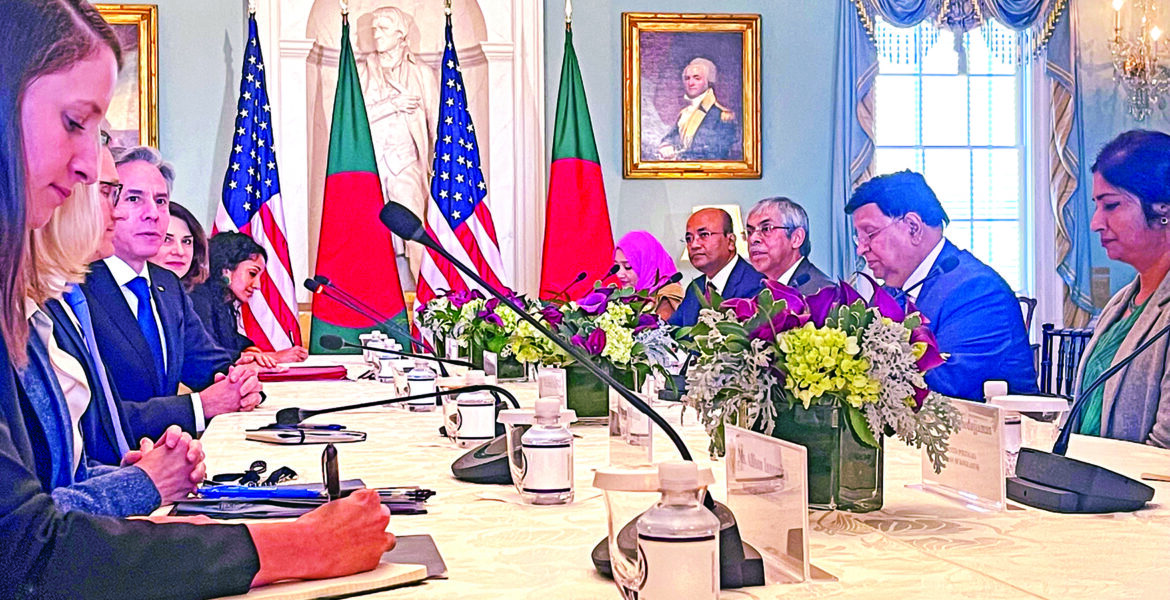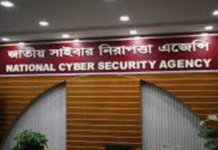
The United States appears to have sent its clearest message yet to Bangladesh that a fair and inclusive election is imperative for continued growth of relations between the two countries. The message came during the meeting between Bangladesh’s Foreign Minister Abdul Momen and US Secretary of State Antony Blinken on April 10 in Washington D.C. FM Momen’s visit came on the heels of several high-profile visits of US officials to Bangladesh in recent months. In a short but emphatic remark at the beginning of the bilateral meeting, Secretary Blinken emphasized the need for free and fair elections and respect for democracy and human rights in Bangladesh. He restated “US commitment to promoting inclusive economic growth, free and fair elections, human and labor rights, and freedom of expression in Bangladesh.”
While Secretary Blinken thanked Bangladesh for hosting Rohingya refugees and highlighted the nearly $2.1 billion in U.S. humanitarian assistance since 2017, he did not shy away from the central message that the US is closely watching political developments in Bangladesh. Secretary Blinkin is reported to have said that the world is looking to Bangladesh to set a strong example of free and fair elections for the region and beyond. The election is scheduled to take place in January 2024.
The meeting between Blinken and Momen took place as Bangladesh was witnessing further erosion of freedom of expression in recent months, especially attacks on media. A case against Matiur Rahman, the editor of the largest circulated Bengali daily, was filed on 29 March along with another naming a reporter of the newspaper. The reporter Shamsuddin Shams was picked up by plain-clothed police in the wee hours of 28 March and remained incommunicado for 30 hours, in a clear violation of the country’s existing laws. The case was filed under the country’s draconian Digital Security Act (DSA) which was enacted by the incumbent ahead of the last election. A newspaper owned by the country’s main opposition was closed down in February.
In an oblique reference to these disturbing developments, “Secretary Blinken expressed concerns about violence against and intimidation of the media and civil society, including under the Digital Security Act. He underscored that free and fair elections and respect for human rights in Bangladesh are critical as we seek to deepen our bilateral relationship” according to a press release of the State Department.
In the recent months, the United States has consistently voiced its support for a functioning democracy and ensuring human rights and freedom of expression in Bangladesh. After two controversial elections held in 2014 and 2018 under the current Sheikh Hasina regime, analysts and observers describe the country as effectively a one-party state. Opposition activists and dissenting voices have been muzzled. The previous two polls were marred by allegations of vote rigging on the election day and systematic intimidation of the voters and the opposition candidates, especially those from Bangladesh Nationalist Party (BNP), in the preceding months. Local and international rights organizations and corruption watchdogs like Transparency International Bangladesh (TIB) documented cases of voter and candidate intimidation by security agencies and ruling party goons. Western governments including the United States called for a probe into the allegations, which was not heeded by the government.
Although at the meeting Momen reaffirmed Bangladesh government’s commitment to a free, fair, and credible election and welcomed election observers from the US, Bangladesh’s ruling party’s willingness in this regard has remained suspect. Observers believe that the Hasina government may try to repeat the 2014 and 2018 elections. The ruling party dismissed the calls from the opposition to hold the polls under a non-partisan administration which the latter see as key to ensuring a fair and free voting environment. The opposition demand and similar calls from the international community have been responded to by the Bangladesh’s ruling party with verbal assault and unfounded counter allegations.
The day before the Blinken-Momen meeting Bangladesh’s Prime Minister Sheikh Hasina’s son and her information and communication technology (ICT) adviser Sajeeb Wazed Joy blasted the United States and accused its State Department of hypocrisy. Sajeeb Wazed wrote on his Facebook profile: “US State legislature votes to expel two minority lawmakers, while keeping a third who was white. This is the state of democracy in the US. The US State Department are nothing but a bunch of hypocrites.” This statement was followed up by the PM Hasina. On 10 April, Hasina delivered a scathing criticism of the US foreign policy in a speech in the parliament. She accused Washington of changing regimes in various parts of the world. “America can change power in any country it wants. They want to bring such a government here which will not have any democratic existence,” she added. Hasina, in the same speech said that the Prothom Alo is ‘the enemy of the Awami League, democracy and the people of the nation.’ When the criticisms and persecution of media was brought to the attention to the State Department during a press briefing by South Asia Perspective, Vedant Patel, the State Department principal deputy spokesperson termed the DSA “one of the world’s most draconian laws for journalists.”
Vedant Patel said, “one of the biggest reasons that Bangladesh fell to 10 places to 162 out of 180 countries in the latest World Press Freedom Index was the Digital Security Act.”
As the message from Washington is getting louder and unequivocal regarding the forthcoming election in Bangladesh, it remains to be seen how the Awami League leadership, particularly Sheikh Hasina, will respond. Regardless, there is a growing consensus among Bangladesh watchers that another fraudulent election will have serious implications not only for the country but also for the region and beyond. Democracy proponets hope the international community stake note of the possible trajectory and adopts an unwavering stance on ensuring that a free, fair and acceptable election is held where the people’s mandate is reflected.









